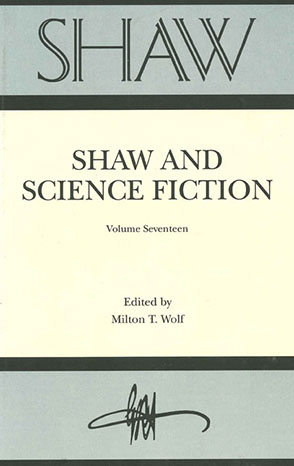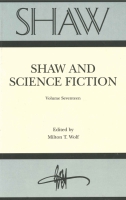
SHAW: The Annual of Bernard Shaw Studies, Vol. 17
Shaw and Science Fiction
Edited by Milton Wolf
SHAW: The Annual of Bernard Shaw Studies, Vol. 17
Shaw and Science Fiction
Edited by Milton Wolf
Shaw's speculations about human destiny align him with many other writers of the time, and later, who forged a new genre of literature that ultimately took the name in 1928 of "science fiction." Ray Bradbury affirms Greg Bear's statement about the little-known, but significant, relationship that Bernard Shaw has with science fiction. Bradbury, who frequently emphasizes Shaw's influence on his own work, asks, "Isn't it obvious at last: Those that do not live in the future will be trapped and die in the past?"
- Description
- Table of Contents
- Subjects
Susan Stone-Blackburn, comparing Shaw's Back to Methuselah with Olaf Stapledon's Last and First Men, discusses why science-fiction scholars have been reluctant to acknowledge Shaw's role in the genre. Tom Shippey examines aspects of Shaw's theory of Creative Evolution to show why many have dismissed Shaw's science fiction as insufficiently scientific.
Surveying the science-fiction milieu, Ben P. Indick shows that while Shaw was not interested in writing science fiction per se, he knew the genre and how to use it. Jeffrey M. Wallmann chronicles the science-fiction techniques that Shaw foreshadowed. Rodelle Weintraub analyzes dream-related elements of the fantastic that Shaw frequently employed in his drama. John Barnes focuses on Shaw's "radical superman," a stock-in-trade of science fiction.
Like H. G. Wells, Shaw understood that human intervention was becoming the dominant mechanism of evolution and that new approaches to theatrical drama would be required to convey the social and political impact of the scientific revolution. Elwira M. Grossman compares similar dilemmas facing Shaw and the Polish dramatist Witkacy. J. L. Wisenthal examines the utopian tradition that underlay the English literary experience, and Julie A. Sparks contrasts Karel Capek's anti-utopian concepts with Shaw's utopian vision. Also included is an 1887 lecture by Shaw entitled "Utopias," published here for the first time.
Several of the contributors emphasize the significant influence that Shaw had on major science-fiction writers. Elizabeth Anne Hull explores Shaw's affinities with Arthur C. Clarke, John R. Pfeiffer discusses the many connections between Shaw and Ray Bradbury, and George Slusser explores Shaw and Robert A. Heinlein's "recurrent fascination with the possibilities of life extension."
Like his friend Einstein, Shaw knew that imagination is more important than knowledge. Peter Gahan's article demonstrates that Shaw's ambition was to engage the reader's imagination, the only "sufficient backdrop for his vision."
Also included are reviews of recent additions to Shavian scholarship, including the Shaw/Wells correspondence, and John R. Pfeiffer's "Continuing Checklist of Shaviana."
Contents
NOTICES ix
FOREWORD: SHAW AND SCIENCE FICTION 1
Milton T. Wolf
1. G.B.S.: REFURBISHING THE TIN WOODMAN: SCIENCE
FICTION WITH A HEART, A BRAIN, AND THE NERVE! 11
Ray Bradbury
2. SHAW'S SCIENCE FICTION ON THE BOARDS 19
Ben P. Indick
3. WITKACY AND SHAW'S STAGE STATUES 39
Elwira M. Grossman
4. SHAW'S UTOPIAS 53
J. L. Wisenthal
5. UTOPIAS 65
Bernard Shaw
6. EVOLUTIONARY MACHINERY: FORESHADOWINGS OF SCIENCE FICTION IN BERNARD SHAW'S DRAMAS 81
Jeffrey M. Wallmann
7. BERNARD SHAW'S FANTASY ISLAND: SIMPLETON OF THE UNEXPECTED ISLES 97
Rodelle Weintraub
8. ON HIS SHOULDERS: SHAW'S INFLUENCE ON CLARKE'SCHILDHOOD'S END 107
Elizabeth Anne Hull
9. RAY BRADBURY'S BERNARD SHAW 119
John R. Pfeiffer
10. LAST MEN AND FIRST WOMEN: THE DYNAMICS OF LIFE EXTENSION IN SHAW AND HEINLEIN 133
George Slusser
11. TROPICS OF A DESIRABLE OXYMORON: THE RADICAL SUPERMAN IN BACK TO METHUSELAH 155
John Barnes
12. SHAW FOR THE UTOPIANS, ČAPEK FOR THE ANTIUTOPIANS 165
Julie A. Sparks
13. SCIENCE AND SPIRITUALITY IN BACK TO METHUSELAH AND LAST AND FIRST MEN 185
Susan Stone-Blackburn
14. SKEPTICAL SPECULATION AND BACK TO METHUSELAH 199
Tom Shippey
15. BACK TO METHUSELAH: AN EXERCISE OF IMAGINATION 215
Peter Gahan
REVIEWS
THE WAR OF THE WORLD-BETTERERS (Selected
Correspondence of Bernard Shaw: Bernard Shaw and H. G. Wells, edited by J. Percy Smith) 239
R. F. Dietrich
INDEFATIGABLE! (Selected Correspondence of Bernard Shaw: Bernard Shaw: Theatrics, edited by Dan H. Laurence) 246
Leon H. Hugo
WIT, COMMON SENSE, AND PROPHETIC VISION (The
Complete Prefaces, Vol. 2: 1914-1929, edited by Dan H. Laurence and Daniel J. Leary) 253
Sally Peters
INTERSECTIONS (Shaw's People: Victoria to Churchill by Stanley Weintraub) 258
Margot Peters
THE LATEST BIOGRAPHY OF SHAW (Ascent of the Superman by Sally Peters) 261
Frederick P. W. McDowell
SHARDS OF SHAW (Shaw and Joyce: "The Last Word in
Stolentelling" by Martha Fodaski Black) 265
J. L. Wisenthal
A CONTINUING CHECKLIST OF SHAVIANA 271
John R. Pfeiffer
CONTRIBUTORS 293
Mailing List
Subscribe to our mailing list and be notified about new titles, journals and catalogs.



